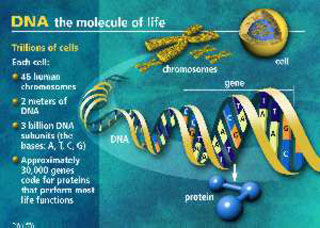The recent rapid advances in the knowledge about human genetics, largely the result of an international research initiative known as the Human Genome Project, have been accompanied by numerous legal and ethical concerns. For instance, because genetic research is so costly, and because there is potential for great commercial gain, one issue has become particularly troublesome: who owns human genetic material?
Patents
This issue relating to the ownership of genetic material has most clearly manifested itself in the area of patenting. A patent grants its holder exclusive commercial control over new, useful and inventive creations. Should researchers and investors be allowed to patent human DNA? Although many of the ethical and legal concerns that surround this issue are far from being resolved (e.g., to what degree should patients have control over what is done with their DNA?), the Canadian patent office considers human DNA to be a patentable subject matter. As such, the patenting of human genetic material has continued unabated. It should be noted, however, that jurisdictions vary enormously in the way in which they address the general issue of "human tissue ownership" - ranging from the very "pro-patent" US to the more cautious approach of the European nations. Canada's position, as is often the case, seems to reside between the two extremes. We do not allow the patenting of higher life forms, as they do in the US, but we do consider such things as cell lines, DNA and single-cell organisms to be patentable. This intermediate approach will likely guide future Canadian patenting policies.
Recently, the potential impact of gene patents on the cost of the health care system has become a significant policy issue. For example, the holder of a patent on a disease gene may charge a premium for diagnostic testing. This may mean that the public health care system will not be able to afford the cost of providing the patented "invention." As a result of this concern, some policy-making entities in Canada and around the world have recommended revisions to the patent system that would ensure continued access to beneficial genetic services.
Legal and Ethical Concerns
The new genetic technology has introduced many other legal and ethical concerns. For example, there is fear that the new genetic tests and screening techniques will be utilized by insurance companies and government agencies and will thereby lead to "genetic discrimination." That is, an individual's genetic profile will be used to make determinations of, for example, insurability. To date, there is little evidence that this is happening, or will ever happen, in Canada. Nevertheless, given the unique personal, familial and social nature of genetic information, the concern is arguably justified. Indeed, recent survey research suggests that, rightly or not, Canadians believe genetic information is special and that rules governing access should be especially strict. In 2017, the Genetic Non-Discrimination Act received royal assent and became federal law. The Act protects the genetic information of Canadians and prohibits a service provider or anyone entering into a contract with an individual to require the said “individual to undergo a genetic test or disclose the results of a genetic test.” The Act also prohibits sharing of genetic test results without written consent.
Evidentiary Role
Genetics is also playing an increasingly significant evidentiary role in Canadian courts. DNA is a very stable molecule and is found in almost all human cells (e.g., hair, white blood cells, saliva, skin and sperm). As a result, and because a given DNA profile is virtually totally unique, DNA samples have emerged as a powerful form of criminal evidence. DNA was first used successfully in 1986 in Great Britain to track down a murderer and has since been utilized by criminal courts throughout the world. In Canada, it has been used in numerous high-profile cases - including a case in which DNA evidence was used to exonerate an individual who was in prison for the murder of a young girl. (See also Wrongful Convictions in Canada.)
Role in Family Law Disputes
Genetic evidence can also play an important role in family law disputes (by establishing the paternity of children for cases dealing with maintenance or custody); immigration applications (by determining whether an individual is truly a relative of an immigrant); and in estate cases (by establishing who is related to the testator).
"Geneticization"
One of the broadest concerns associated with the recent advances in genetics is that they will fundamentally alter how we view ourselves and others. Specifically, the concern is that we will inappropriately emphasize the inaccurate belief that genes are deterministic of who we are as individuals, thus de-emphasizing or forgetting the social, economic and environmental factors relevant to the human condition.

 Share on Facebook
Share on Facebook Share on X
Share on X Share by Email
Share by Email Share on Google Classroom
Share on Google Classroom







